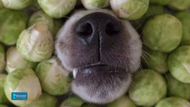Can Dogs Eat Brussels Sprouts?
Posted by volhard dog nutrition on Mar 19th 2024
Among the various foods worthy of your dog's diet, Brussels sprouts stand out due to their nutritional value.
These small, green vegetables are known for their health benefits in humans, but the question remains:
"Can dogs enjoy these health benefits, too?"
Let's explore the safety and nutritional aspects of feeding Brussels sprouts to dogs!
Can Dogs Eat Brussels Sprouts?
Yes, dogs can eat Brussels sprouts in moderation.
They can make a valuable contribution to your dog's diet, offering them a variety of nutrients while keeping their meals interesting.
5 Health Benefits of Brussels Sprouts for Dogs
Brussels sprouts are not only safe for dogs to eat but also offer various health benefits due to their nutritional content:
- Rich in Vitamins: Brussels sprouts contain vitamin C and vitamin K. Vitamin C is crucial for strengthening your dog's immune system, helping them fight off illnesses more effectively. Conversely, vitamin K plays a vital role in blood clotting and bone health.
- High in Fiber: The fiber in Brussels sprouts aids in digestion, helping to keep your dog's digestive system running smoothly. It can also contribute to maintaining a healthy weight by making your dog feel fuller for longer.
- Antioxidant Properties: Brussels sprouts are packed with antioxidants, which help combat oxidative stress and may reduce the risk of chronic diseases. Antioxidants also support cell function, keeping your dog's body healthy at the microscopic level.
- Supports Blood Circulation: The nutrients found in Brussels sprouts improve blood circulation, ensuring that oxygen and vital nutrients are efficiently delivered throughout your dog's body.
- Beneficial to Dogs with Kidney Disease: Brussels sprouts and other dark, leafy greens help remove waste proteins from their intestinal tracts. This is particularly beneficial as it helps maintain lower Blood Urea Nitrogen (BUN) levels, which are vital for the health of dogs with kidney issues.
The Downsides of Feeding Brussels Sprouts to Dogs
As part of the cruciferous vegetables family, Brussels sprouts cause gassy stomachs in dogs if consumed abundantly.
While keeping your dog's digestive system healthy is essential, introducing large amounts of these vegetables can disrupt digestion, leading to tummy troubles.
Another concern is that raw Brussels sprouts can be challenging for dogs to chew and digest, posing a choking hazard.
Whole Brussels sprouts, especially for smaller dogs, could obstruct the gastrointestinal tract, potentially leading to an intestinal blockage. Cook Brussels sprouts appropriately before feeding your pup, as cooking softens them.
Preparing and Feeding Brussels Sprouts to Dogs
Start by selecting fresh or frozen Brussels sprouts.
If you're using fresh ones, ensure they're clean and pesticide-free. Frozen Brussels sprouts can be a convenient option, but avoid those with added seasonings or sauces.
Remove the Brussels sprout stalks, as they can be difficult for dogs to digest and may cause gastrointestinal upset if not removed.
Cook the Brussels sprouts before serving them to your dog.
Avoid adding salt, oil, or spices that could be harmful to your dog.
Once cooked, let the Brussels sprouts cool down to room temperature. Then, cut them into bite-sized pieces appropriate for your dog's size and puree them for enhanced digestibility. This process will prevent choking hazards and ensure the sprouts are easier to eat and digest.
How Many Brussels Sprouts Should I Be Feeding Your Dog?
Moderation is key when feeding Brussels sprouts to dogs.
The exact number of Brussels sprouts that dog parents should feed their dogs depends on their size and dietary needs. As a general guideline, small dogs can have one or two tiny Brussels sprouts, while larger dogs may be able to handle three or four. However, they should be given sparingly and not all at once.
Brussels sprouts are high in fiber, which is beneficial for a dog's digestion in small amounts. Still, too much can cause gastrointestinal upset, including gas and diarrhea. Start with a small amount to see how your dog reacts, especially if they've never had Brussels sprouts before.
Treats, including Brussels sprouts, should comprise at most 10% of your dog's daily diet. Most of their nutrition should come from a well-balanced diet that meets all their nutritional needs.
If you're unsure how many Brussels sprouts to feed your dog or if they are appropriate for your dog's diet, consult a canine nutritionist. They'll provide advice based on your dog's specific health and nutritional requirements.
Green Light for Greens: Safely Adding Brussels Sprouts to Your Dog's Diet
Feeding Brussels sprouts to your dog will be a healthy addition to their diet when done in moderation.
Prepare the Brussels sprouts properly by cooking and cutting them into bite-sized pieces, and introduce them slowly to avoid digestive issues.
While these green veggies offer nutritional benefits, they should only be a small part of a well-balanced diet tailored to your dog's needs.
By following these guidelines, you will safely share the goodness of Brussels sprouts with your furry friend!
For more advice on dog nutrition, health, and training, make sure that you contact us and check out our blog!
Volhard Dog Nutrition and its expert nutritionists are now offering online consultations to help more dog parents discover why and how to feed their dogs the healthiest of foods!
Speaking to a Volhard nutritionist will help you understand the inseparable relationship between healthy food, a healthy body, and a healthy mind.
If you want to contact one of our Volhard nutritionists, don't hesitate to access our consultation page!

